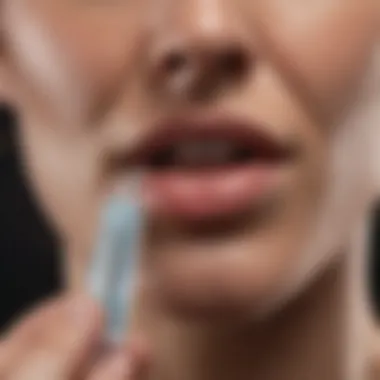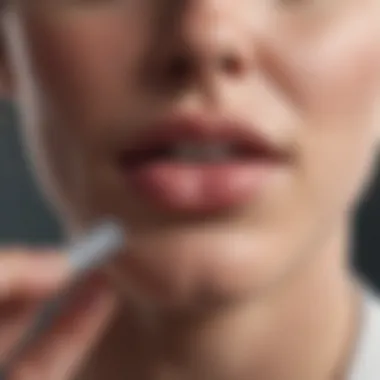Top Over-The-Counter Remedies for Cold Sores


Intro
Cold sores, primarily caused by the herpes simplex virus, can create a significant burden for individuals who suffer from them. These lesions can arise unexpectedly, often resulting in discomfort, embarrassment, and sometimes, a feeling of isolation. In the quest for relief, many turn to over-the-counter medications. This article aims to evaluate these options and equip readers with necessary knowledge for effective cold sore management.
The landscape of over-the-counter cold sore treatments is diverse, making it both a resource and a puzzle. Products vary not only in active ingredients but also in their mechanisms of action. Understanding key components is essential. By analyzing user feedback and expert recommendations, we can identify which treatments provide genuine relief. Furthermore, it is important to discuss preventive measures that can aid in reducing the frequency and severity of outbreaks.
With this guide, health professionals, wellness coaches, and individuals impacted by cold sores can explore practical solutions. This initiative does not merely point towards various treatments; it aims to foster a more nuanced understanding of cold sore management as part of overall health strategy. As we delve into the specifics of available medications, we will lay the groundwork for informed decision making.
Understanding Cold Sores
Cold sores are a common concern for many individuals. They often appear unexpectedly and can cause discomfort and self-consciousness. Understanding cold sores in detail is vital for effective management and treatment. Thorough knowledge helps individuals recognize symptoms early, understand triggers, and differentiate between various over-the-counter options available for relief.
Cold sores are primarily caused by the herpes simplex virus type 1 (HSV-1). While it is important to note that some strains can also be associated with genital herpes, the focus here is on HSV-1, which often manifests on the lips and face. This understanding sets a foundation for comprehending how cold sores function and why timely intervention is crucial.
The benefits of understanding cold sores extend beyond symptom management. It enables individuals to adopt lifestyle measures to minimize outbreaks. Knowledge of potential triggers and treatments equips people to minimize the impact of future episodes, leading to improved quality of life.
What Causes Cold Sores?
Cold sores are primarily caused by the herpes simplex virus. Transmission occurs through close contact, often during childhood. After the initial infection, the virus remains dormant in the body. Various factors can provoke an outbreak of symptoms, including stress, fatigue, or exposure to sunlight. Understanding this lifecycle is fundamental in minimizing recurrence.
Symptoms and Characteristics
Recognizing cold sores is crucial for timely treatment. They generally begin with a tingling or itching sensation around the lips, followed by the appearance of small, fluid-filled blisters. These sores usually last for 7 to 10 days before crusting over and healing. Knowing these characteristics allows for early intervention, potentially reducing the duration and severity of outbreaks.
Triggers for Cold Sores
Identifying what triggers cold sores is essential for preventive strategies. Common triggers include:
- Stress: Emotional or physical stress can prompt activation of the virus.
- Sun Exposure: Overexposure to ultraviolet rays can lead to outbreaks.
- Illness: A weakened immune system due to other illnesses makes the body more susceptible.
- Hormonal Changes: Fluctuations, particularly during menstruation, can trigger outbreaks.
Awareness of these triggers can help individuals manage their health better and reduce the chances of episodes occurring.
The Role of Over-the-Counter Treatments
Over-the-counter (OTC) treatments for cold sores represent a crucial aspect of managing outbreaks caused by the herpes simplex virus. Individuals experiencing this common condition often seek immediate relief from the discomfort and the visible symptoms associated with cold sores. Thus, understanding the range of OTC options available is vital for empowering those affected to make informed decisions about their care.
OTC treatments provide accessibility and convenience. Unlike prescription medications, these products can be obtained without a doctor's visit, making them easily reachable. This is particularly beneficial for those who prefer to handle cold sore symptoms rapidly and with minimal fuss. Furthermore, OTC medications are designed to address various aspects of cold sore management. They can alleviate pain, reduce swelling, and promote healing, creating a multi-faceted approach to treatment. Having different options allows individuals to choose one that best fits their needs or preferences.
When evaluating OTC treatments, considerations must include active ingredients, application methods, and personal sensitivity to these medications. It is also important to recognize the limitations of OTC options. While they can effectively manage symptoms, they typically do not eradicate the virus itself. Therefore, ongoing awareness and preventative strategies remain essential for long-term management.
Overview of OTC Medications
OTC medications for cold sores come in diverse formulations with varying active ingredients. Understanding these medications can help in selecting the most suitable option. Many individuals are familiar with topical creams featuring Acyclovir or Docosanol, which specifically target the herpes virus. In addition to creams, some gels and patches provide alternative delivery methods.


The main categories of OTC cold sore treatments include:
- Topical Creams: Commonly used for on-spot application, these creams are readily absorbed into the skin, providing targeted relief and support for healing.
- Gels: Gels often have a different consistency than creams and may provide a cooling effect that can soothe irritation upon application.
- Patches: These are designed to adhere to the skin, offering antimicrobial properties while protecting the sore from further irritation or infection.
As the market continues to expand, new formulations and combinations appear, making it important for individuals to stay informed about the available choices.
Advantages of OTC Treatments
The advantages of over-the-counter treatments for cold sores can be summarized as follows:
- Ease of Access: Available at pharmacies and retail stores, letting users easily obtain treatment without prescriptions.
- Rapid Resolution: Many products are formulated to target symptoms quickly, offering prompts relief to discomfort and soreness.
- Cost-Effectiveness: OTC medications are often more affordable than prescription drugs, promoting adherence and accessibility.
- Variety of Options: Users can compare different products based on ingredients, application forms, and personal preferences.
Common Ingredients in Cold Sore Treatments
Understanding the common ingredients found in over-the-counter cold sore treatments is essential for choosing the most effective option. Many of these active ingredients work in various ways to mitigate the symptoms of cold sores, which are primarily caused by the herpes simplex virus. By knowing what each component does, consumers can make informed decisions about their treatment options.
Acyclovir and Penciclovir
Acyclovir is an antiviral medication that effectively inhibits the replication of the herpes simplex virus. It is available in topical cream form, which means it can be directly applied to the blistered area. Penciclovir is another antiviral agent that works similarly but is often used for a longer duration. Both ingredients reduce the duration of symptoms, but they work best when applied at the first sign of an outbreak. Potential users must be aware of the best application methods to maximize efficacy; for instance, application should ideally occur five times a day.
Docosanol
Docosanol offers a different approach to cold sore treatment. It acts as a barrier to viral entry into healthy skin cells. By preventing the virus from replicating, it can reduce the length of an outbreak. Docosanol is available in a cream formulation and is generally applied five times a day, starting at the first sign of cold sore symptoms. It is important to note that some users may experience irritation upon application, making it crucial to test the product before fully committing to its use.
Lysine
Lysine is an amino acid that has gained popularity as a dietary supplement for cold sore prevention. It is believed to inhibit the replication of the herpes simplex virus, potentially reducing the frequency of outbreaks. Although relatively safe, users should consider the dosage and consult a professional to determine if it suits their health needs. It may also serve as a complementary treatment alongside topical medications for enhanced effectiveness.
Potential users should always consult healthcare professionals if they are unsure about which treatment is right for them.
In summary, the ingredients in cold sore treatments play a crucial role in their effectiveness. Acyclovir and penciclovir target viral replication, while docosanol creates a barrier against the virus. Lysine can assist in prevention. Understanding these ingredients will help consumers select the right medication for their individual needs.
Top Over-the-Counter Products
When managing cold sores, selecting the right over-the-counter (OTC) product is vital. The effectiveness of these treatments can vary widely. This section will address why it is important to evaluate and understand the leading OTC products for cold sores.
Cold sores are usually caused by the herpes simplex virus. They can cause uncomfortable sensations, such as burning and itching. Using the appropriate OTC product can lessen pain and speed up healing. Also, these products often enhance overall quality of life during an outbreak. In an age where options abound, discerning the best choices becomes crucial.
Comparative Analysis of Leading Brands
Many OTC products exist on the market today. Some familiar brand names include Abreva, Blistex, and Zilactin. Each product contains unique active ingredients and has its own mechanism of action.
- Abreva is notable for containing docosanol. This ingredient inhibits the virus's ability to penetrate healthy cells, offering faster healing.
- Blistex contains a blend of analgesics and moisturizers that provide temporary relief from dryness and irritation.
- Zilactin is a product that features a protective gel, which forms a barrier over the sore, preventing further irritation.


Understanding these differences can aid consumers in choosing the most effective treatment based on their symptoms and preferences. Evaluating user reviews and scientific backing also provides insights on which brands perform best.
Application Methods and Formulations
The effectiveness of any cold sore treatment depends not only on its active ingredients but also on how it is applied. Products are typically available in various forms including creams, gels, and patches. Each formulation has its own benefits:
- Creams and ointments can be applied directly to the sore. They may provide quick relief but can be messy.
- Gels often dry quickly and provide a long-lasting effect. They usually feel lighter on the skin.
- Patches offer consistent delivery of medication. They also protect the sore from irritants such as food and moisture.
Each method has its pros and cons. Some users may prefer convenience, while others may prioritize intensive treatment. Knowing which method works best is essential to ensuring adherence and effectiveness.
Efficacy and User Reviews
To make an informed choice, looking into user feedback is critical. Many consumers share their experiences online, which can highlight the effectiveness of different OTC products. Common aspects to consider from these reviews include:
- Time to healing: How long it took for users to see results after starting treatment.
- Pain relief: Users often report on the level of pain or discomfort experienced before and after using the product.
- Reoccurrence: Some users discuss whether they continue to experience cold sores after using the product.
It is important to recognize that individual results may vary. A product that works well for one person may not be effective for another. However, evaluating aggregated user experiences can provide significant insights into overall product efficacy.
"Choosing an OTC product requires attention to both ingredient efficacy and personal experience."
Understanding the landscape of available OTC products enables individuals to approach their cold sore treatment in a more informed and effective manner.
Preventive Measures Against Cold Sores
Cold sores are a common ailment caused by the herpes simplex virus. However, the frequency and severity of outbreaks can often be reduced through various preventative measures. This section discusses why these measures are important. By addressing triggers and fostering a supportive lifestyle, individuals can minimize the impact of cold sores on their lives.
Effective preventive measures can contribute significantly to overall emotional well-being. These measures not only reduce the incidence of outbreaks but can also enhance quality of life. Individuals dealing with cold sores often face social stigma, leading to lowered self-esteem and feelings of isolation.
Lifestyle Modifications
Lifestyle plays a crucial role in managing cold sores. Certain habits may increase the likelihood of outbreaks, while others can serve as deterrents. Consider the following modifications:
- Stress Management: High stress levels can weaken the immune system. Engaging in activities such as yoga, meditation, or regular physical exercise helps manage stress.
- Proper Sleep: Lack of sleep can trigger outbreaks. Prioritize quality sleep by establishing a routine and creating a restful environment.
- Protective Measures: In sunny environments, applying lip balm with SPF provides protection against the sun, which is a known trigger for many.
By implementing these lifestyle changes, individuals may notice a reduction in the frequency of their outbreaks.
Nutrition and Immune Support
Eating well plays a pivotal role in immune strength. A robust immune system can effectively deter the herpes simplex virus from emerging. Key aspects of nutrition include:
- Stay Hydrated: Drink plenty of water. Hydration supports bodily functions and keeps the skin healthy.
- Balanced Diet: Consume a variety of fruits and vegetables rich in vitamins and minerals. Foods high in antioxidants can help combat oxidative stress.
- Lysine-Rich Foods: Foods like yogurt, fish, and legumes may be beneficial. Lysine has been noted for its potential to reduce the frequency of cold sore outbreaks.
Incorporating these dietary strategies can enhance overall health and provide backup to the body's defenses against cold sores.


"Preventing cold sore outbreaks is often about lifestyle and nutrition. Simple adjustments can create significant impacts."
Taking these preventive measures into consideration allows individuals to take control of their health effectively.
Consulting Healthcare Professionals
Cold sores can be a nuisance. Consulting healthcare professionals can provide significant insights and guidance when it comes to managing this condition. Doctors or pharmacists have the expertise to recommend effective treatments based on individual needs. They are familiar with the various over-the-counter options and can help navigate which ones align best with personal health circumstances.
One key benefit of consulting professionals is identifying the specific type of cold sore you’re dealing with. Not every sore responds the same way to treatment. For some patients, it might be necessary to explore alternative therapies that consumers may overlook. Healthcare professionals can also help discern the difference between a cold sore and other types of sores or skin conditions that may resemble cold sores.
Additionally, professionals offer a critical perspective on potential complications. Sometimes, what starts as a common cold sore can escalate to more severe issues, especially for individuals with compromised immune systems. Consulting a healthcare provider helps to stay ahead of potential risks.
"Seeking medical advice is a proactive step in managing cold sores effectively."
When to Seek Medical Advice
It is important to recognize the signs that indicate when to seek medical advice regarding cold sores. If a cold sore persists longer than two weeks, that might signal an underlying issue requiring further evaluation. High fever or swelling around the sore could also indicate a bacterial infection. In such cases, it is prudent to consult a professional. Persistent or severe pain can be another reason to seek help. If self-treatment with over-the-counter medications does not improve the condition, further intervention may be necessary.
Assessing the Need for Prescription Treatments
Understanding when prescription treatments are appropriate is an essential consideration in cold sore management. Over-the-counter options can be effective for many individuals. However, for those experiencing frequent outbreaks or severe symptoms, prescription medications may provide better relief.
Prescription treatments typically include stronger antiviral medications, which have demonstrated higher efficacy than OTC options. Healthcare providers will assess individual cases, considering factors such as the frequency of outbreaks, the severity of symptoms, and the overall health of the patient. If it is determined that an individual might benefit from a prescription, a healthcare professional will initiate a discussion about treatment options, potential side effects, and follow-up plans.
In summary, consulting healthcare professionals is a valuable step in managing cold sores. They offer expert advice on treatment options and help assess whether a prescription is needed. This collaboration fosters a better understanding of one's health and ensures optimal care.
Future Trends in Cold Sore Treatment
The field of cold sore treatment continues to evolve. Understanding future trends is crucial for both patients and healthcare practitioners. As the prevalence of cold sores persists, the quest for more effective treatments is ongoing. Innovations in medication development and research into alternative therapies may provide new avenues for relief. This future-focused perspective outlines how advancements could significantly impact the management of cold sores.
Innovations in Medication Development
Recent years have marked a shift towards more targeted antiviral therapies. Companies are exploring novel compounds that specifically inhibit the herpes simplex virus's ability to replicate. These innovations aim to reduce the duration of outbreaks and minimize symptoms.
Several promising developments can be highlighted:
- Nanotechnology: Utilizing nanoparticles might improve the delivery of antiviral medications directly to affected areas. This technique could enhance absorption and effectiveness.
- Combination therapies: Researchers are examining the potential of combining existing medications, such as acyclovir with newer agents. This might amplify antiviral effects and reduce resistance.
- Gene editing: There are early-stage studies utilizing CRISPR technology to target the genetic material of the virus. If successful, such methods could eliminate the virus from infected cells altogether.
By focusing on these innovations, the treatment landscape for cold sores may soon feature options that are more efficient and user-friendly.
Research on Alternative Therapies
Alongside conventional methods, alternative therapies are gaining interest. These options often emphasize holistic approaches to health. Emerging research suggests certain therapies might complement or enhance the effectiveness of established treatments.
Key areas of investigation include:
- Herbal remedies: Some studies report that plants like lemon balm may have antiviral properties. These remedies could offer additional relief when used alongside over-the-counter treatments.
- Nutritional support: Research continues into the role of diet in managing outbreaks. Supplements such as lysine may decrease the frequency of infections, suggesting a need for further exploration of dietary interventions.
- Mindfulness and stress reduction: Since emotional and physical stress can trigger outbreaks, practices like yoga and meditation are under study. These approaches may help strengthen the immune response and reduce incidence rates.
"A comprehensive approach, integrating medication with diet and lifestyle, may offer the most robust defense against cold sore outbreaks."
The future will likely see an integration of these alternative methods with traditional treatments, providing patients with a broader array of options.







